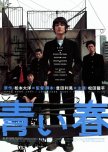A Powerful Portrayal of Alienated Teens During Japan's "Lost Decade"
"Blue Spring" is regarded as a minor classic in Japan, and for 3 good reasons. First, the director maintains a swift pace and holds your interest despite the absence of one overarching plot (instead, the plot's fueled by a number of different acts of alienation portrayed by an ensemble cast). Second, it features then unknown teenage actors who went on to have extremely successful careers -- eg, Matsuda Ryuhei, Arai Hirofumi and Nagayama Eita.
Third, it is set in the late-90's, right when Japan's economic bubble had burst and the nation was reeling with unemployment, bankruptcy, crime and the inevitability of angry, futureless teens forming gangs. It's this third element more than anything else that accounts for the movie's fame, because this era looms so large in the Japanese psyche that they even refer to it as "The Lost Decade." And it was the teenagers of "The Lost Decade" who felt the brunt of economic despair the most because they were at what should've been the start of careers but were, instead, at the start of a road to nowhere. The movie conveys this hopelessness with excellent dialogue, such as the following exchange between a teen, and a teacher wherein the teen compares himself to a flower:
-- "Teacher, aren’t there some flowers that never bloom?"
-- "Flowers are meant to bloom, not to dry up. That’s what I choose to believe. It’s a very important thing.”
The blooming of flowers is a recurring metaphor, which is also expressed with an inner monologue of a boy who's just dropped out of school. He has realized that his life will never bloom and that he is, as he calls himself, a "loser."
-- "I staked my whole life on baseball. My only goal was the nationals. In this shithole of a school baseball was my only flower. I staked my life on my bat, my dreams on my pitches all to make the spirit of baseball bloom. In the midst of the roaring crowd, a glimpse of my mother's face. She's always there to love even a fool like me. Always ready to smile. I love you so much for that. Even if my body was broken and all my tears and sweat dried up, my dream remained the nationals. No regret for my youth. Loser."
What's especially marvelous about "Blue Spring" is how the theme of teenage alienation is conveyed just as powerfully with a punk rock soundtrack as it is with such dialogue. That is to say, it's the nature of punk rock to speak of the same raw, angry nihilism of futureless youths. And the song "Drop" from the uber cool J-punk band "Thee Michelle Gun Elephant" is pitch perfect for the final plot point.
Music, acting, setting, characters, and theme all converge seamlessly to create a movie that's just as compelling for contemporary audiences as it was to those actually experiencing "The Lost Decade" back then. You see, the movie succeeds as more than a cultural commentary about a specific era, and it does so by evoking a timeless, universal theme -- which is, of course, the timeless, universal theme of teenage alienation.
Third, it is set in the late-90's, right when Japan's economic bubble had burst and the nation was reeling with unemployment, bankruptcy, crime and the inevitability of angry, futureless teens forming gangs. It's this third element more than anything else that accounts for the movie's fame, because this era looms so large in the Japanese psyche that they even refer to it as "The Lost Decade." And it was the teenagers of "The Lost Decade" who felt the brunt of economic despair the most because they were at what should've been the start of careers but were, instead, at the start of a road to nowhere. The movie conveys this hopelessness with excellent dialogue, such as the following exchange between a teen, and a teacher wherein the teen compares himself to a flower:
-- "Teacher, aren’t there some flowers that never bloom?"
-- "Flowers are meant to bloom, not to dry up. That’s what I choose to believe. It’s a very important thing.”
The blooming of flowers is a recurring metaphor, which is also expressed with an inner monologue of a boy who's just dropped out of school. He has realized that his life will never bloom and that he is, as he calls himself, a "loser."
-- "I staked my whole life on baseball. My only goal was the nationals. In this shithole of a school baseball was my only flower. I staked my life on my bat, my dreams on my pitches all to make the spirit of baseball bloom. In the midst of the roaring crowd, a glimpse of my mother's face. She's always there to love even a fool like me. Always ready to smile. I love you so much for that. Even if my body was broken and all my tears and sweat dried up, my dream remained the nationals. No regret for my youth. Loser."
What's especially marvelous about "Blue Spring" is how the theme of teenage alienation is conveyed just as powerfully with a punk rock soundtrack as it is with such dialogue. That is to say, it's the nature of punk rock to speak of the same raw, angry nihilism of futureless youths. And the song "Drop" from the uber cool J-punk band "Thee Michelle Gun Elephant" is pitch perfect for the final plot point.
Music, acting, setting, characters, and theme all converge seamlessly to create a movie that's just as compelling for contemporary audiences as it was to those actually experiencing "The Lost Decade" back then. You see, the movie succeeds as more than a cultural commentary about a specific era, and it does so by evoking a timeless, universal theme -- which is, of course, the timeless, universal theme of teenage alienation.
Considerați utilă această recenzie?

 1
1



















